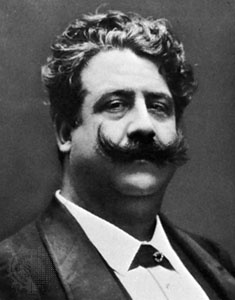Leoncavallo, Ruggero
Italian composer
born March 8, 1857/58, Naples
died Aug. 9, 1919, Montecatini Terme, near Florence
 Neapolitan opera composer whose fame rests on the opera Pagliacci, which, with Pietro Mascagni's Cavalleria rusticana (1890), represented a reaction against Richard Wagner and against Romantic Italian opera; both works substituted for the quasi-historical plot a sensational story from everyday life.
Neapolitan opera composer whose fame rests on the opera Pagliacci, which, with Pietro Mascagni's Cavalleria rusticana (1890), represented a reaction against Richard Wagner and against Romantic Italian opera; both works substituted for the quasi-historical plot a sensational story from everyday life.Leoncavallo studied at the Naples Conservatory and subsequently supported himself by giving café concerts and piano and singing lessons. His first operas, Chatterton (after Alfred de Vigny) and I Medici (first part of a projected trilogy inspired by the Italian Renaissance), failed to attract attention. He followed them with Pagliacci, composed in the verismo, or realistic, style of Mascagni. Produced in Milan in 1892, it was an immediate success. His La Bohème (1897) suffered from comparison with Giacomo Puccini's La Bohème. Zazà (1900) was more successful, but Der Roland (1904), commissioned by Wilhelm II to glorify the Hohenzollerns, was a failure. A number of later works achieved passing success. For most of his operas Leoncavallo was his own librettist and showed a distinct literary ability and a flair for theatrical effect.